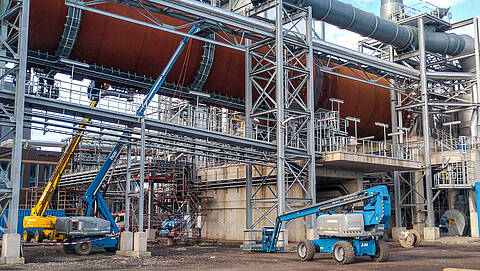
Electrical assembly of a mineral recycling plant Installation and commissioning
Our client:
thyssenkrupp Industrial Solutions AG
thyssenkrupp Industrial Solutions AG is a leading partner for the engineering, construction and service of all industrial plants and systems. With more than 200 years of engineering experience, the company supplies customised, turnkey large-scale plants and equipment for customers in the chemical, fertiliser, cement, mining and steel industries.
The commission
thyssenkrupp Industrial Solutions AG supplied a new thermal cleaning system for tar-containing road debris to Recycling Kombinatie B.V. (REKO) in Rotterdam. After the crushing of the demolition material, the tar with its toxic organic components is burned at a temperature of around 1,000 degrees and thus completely destroyed. The thermal cleaning process leaves behind clean sand, gravel and filler - ready for reuse as a high-quality recycled building material. Energy is also recovered from the hot flue gases in the form of steam, which is then converted into electricity via a steam turbine. thyssenkrupp Industrial Solutions commissioned Blumenbecker Automatisierungstechnik GmbH with the electrical installation of the plant.
Project scope
For many years, thyssenkrupp Industrial Solutions has been working with Blumenbecker Automatisierungstechnik as a partner for worldwide industrial installations. The excellent quality of workmanship, adherence to deadlines and flexibility at short notice are highly valued.
Blumenbecker's 25-strong team of project and site managers and electrical fitters completed the electrical installation work between January and August 2020. After an intensive planning phase for the individual sequences and with the help of special equipment, a total of 68 kilometres of cable were laid and 720 line connections of temperature transmitters, pressure measurements, drives and communication interfaces were made. A special challenge was the coordination and work preparation of the installation team on a pure plant stand area of about 2,500 m² with several installation levels. Parallel to the installation, the finished construction sections were measured according to DGUV V3 as well as the BUS systems, such as specially assembled fibre optic cables. The installation work was completed on schedule in August 2020.
The details
- Lines and cables: 68 km (signal cables, low-voltage cables and fibre optic cables, line cross-sections up to 300 mm²).
- Main cable routes: 1,600 m
- Cable connections: 720 pieces
- Field instruments, sensors and actuators
- Converter cabinets
- Low-voltage switchgear (MCCs)
- Distribution boxes
- Terminal boxes
